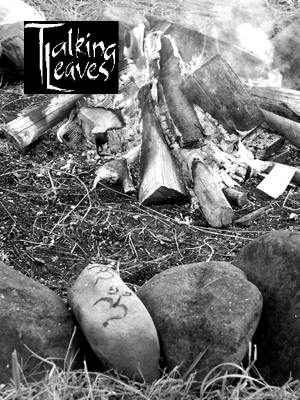And there's factories on the shore
And the world is ill with greed and will
And enterprise of war
But I will lay my burdens
In the cradle of your grace
And the shining beaches of your love
And the sea of your embrace
This is my home
This is my only home
This is the only sacred ground that I have ever known
And should I stray in the dark night alone
Rock me, goddess, in the gentle arms of Eden
--Dave Carter, "Gentle Arms of Eden"
Some readers may notice that this issue's theme has changed from what was originally announced. We solicited submissions about "War, Peace, and Ecology," but we ended up with something a bit different. This issue does include a few articles that discuss war, but it focuses far more on peace--including deep ecology, Permaculture, and other peaceful ways of approaching life. I am happy about this change. The world really does have enough war without our contributing to it and reinforcing it in the pages of Talking Leaves. Any informed person knows the story already, is already saddened, outraged, and probably as educated as much as really necessary in what is going wrong in the world. In this issue, we suggest ways of approaching life-as individuals, as communities, as societies--that provide hopeful alternatives, fresh perspectives, larger contexts in which cooperation, rather than warfare, is the only solution that makes sense for any of us.
Long-time deep ecologist and activist John Seed shared his dynamic "Earth, Spirit, Action" workshop with us in June, and from that workshop springs much of this issue. I interviewed him by phone shortly following the workshop, and also received permission to except four articles from his website, outlining some of the workshop's major components. My phone interview with permaculturalist and forest garden pioneer Dave Jacke anticipates his visit to Lost Valley in October. I asked both of my interviewees about war and peace, and the answers they gave were remarkably similar: peace starts with ourselves, in how we see the world and in the lives we lead. War, which seems to grip many of the power structures of our society, is in fact a much less durable phenomenon than cooperation and peace. If we can reclaim our world-starting in our own lives and in our communities-we will help create the world we have been dreaming about. When the holistic perspectives and cooperative approaches to be found in deep ecology and Permaculture radiate outwards, war becomes obsolete. Will these things prevail? We don't know. As John told me, neither "hope" nor "hopelessness" will really serve us. We can't control the outcome, but we can put our energy into what we find true and beautiful, listening to and acting from our hearts, embracing our connections, rediscovering and expressing our ecological selves. To do anything else is to live only partially. Nothing on the physical plane is truly sustainable anyway-we have at most only a few more billion years of habitable planet left. We can't stop change, impermanence, our individual deaths, or the eventual extinction of every form of life we know-but we may be able to influence whether our species' remaining time on earth is short and fraught with discord and suffering, or long and much more harmonious and joyful. At the very least, we can influence those things in our own lives and in the lives of those around us. Ultimately, as John said, "It's the only game in town" anyway.
As alluded to on the previous page, print-magazine publishing is not the only game in town. Although I am experiencing some inner conflict about this--and finding it a little difficult to let go of what is familiar and comfortable--I am for the most part excited about trying something new. I can't help but notice the irony in the fact that it has sometimes seemed necessary to throw my own life out of balance (by working too much, especially on a computer) in order to create a magazine that is supposedly about balanced, healthy, ecological culture. Nor have I always felt good about all the paper, ink, and embodied energy that has gone into creating boxes and boxes full of magazines, many of them not really spoken for at the time of printing. Our more modest printing approach, and the streamlining of both time and resource use that will hopefully accompany our switch to more online publishing, should help restore that balance in my own life. It will allow me to do less technical and business work and more writing (both for our own website/journal and for magazines like Communities--see their latest issue)--and also to say "enough is enough" at the end of a full day or week in the garden, where my connections to the living world are often far more direct than they are when attempting to lay out a magazine. It will allow me to pursue even more fully what brings me peace, which is often music, not the written word at all. And maybe it will allow me to finally get a firmer grasp on those bird songs I'm trying to learn to recognize.
In any case, I believe my layout editor should be happy now--I've filled this last remaining empty page with words. Thankfully, online journals don't work like that. Need I say more? (No comes the chorus.)
Thank you, goodnight, and peace...
(c)2005 Talking Leaves
Summer/Fall 2005
Volume 15, Numbers 2 & 3
Deep Ecology, Permaculture, & Peace

